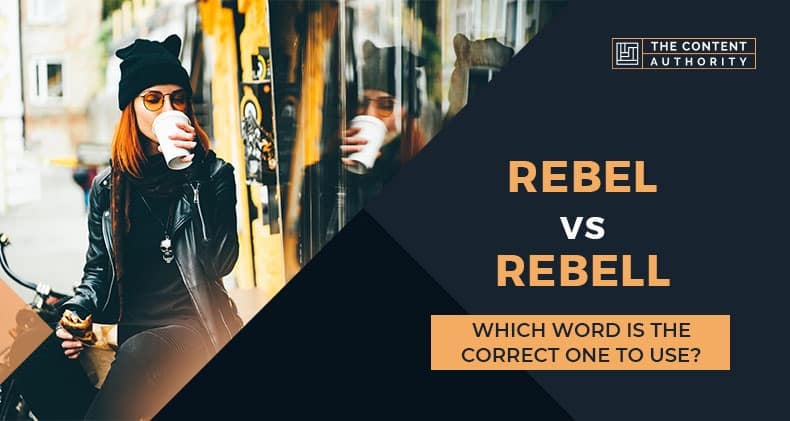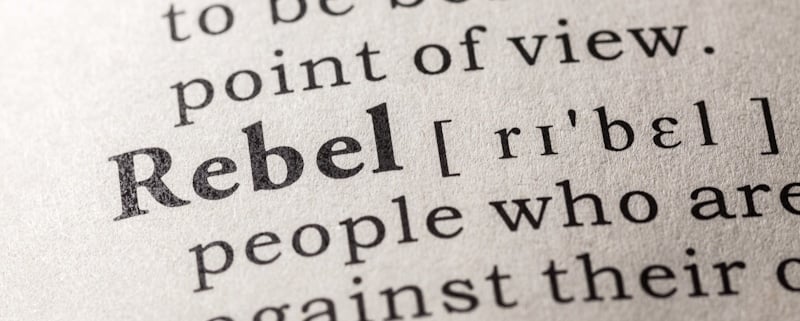It would seem that in today’s times, spelling is the least of our worries. But reality keeps telling us that correct spelling is still essential in our lives. Mastering spelling allows us to organize and express ideas clearly and precisely. Thanks to good spelling, we avoid misunderstandings and errors in communication. At this moment, a question emerges, which is the correct word to use, “rebel” or “rebell?”
The correct word is “rebel.” A common definition of “rebel” is a person who rejects a particular system and resists or takes up arms against the political regime of a state. For its part, “rebell” does not exist in American English, although “rebel” in certain conjugations may have a double L.
Good spelling and written communication allow the person receiving the message to have the correct perception of what we want to convey. Another critical factor is that taking care of our spelling says a lot about our attention to detail and professionalism. This adherence to the right message will help us achieve effective communication and cultivate clear and transparent professional and personal relationships. But to learn more about everything related to the word “rebel,” you should continue reading this article.
What Does The Word Rebel Mean?
Below we will review the primary meanings of the word “rebel” today.
Rebel As A Verb
- “Rebel” is the action of rebelling.
- To “rebel” is to disobey and be against those in authority or control.
- “Rebel” is to renounce and resist to the maximum by force which has the authority of a government.
- “Rebel” is to act and show disobedience and opposition to what is established by society.
- “Rebel” is to show anger or disgust towards the injustices of life openly.
- “Rebel” is to show total rejection or disgust.
Rebel As An Adjective
- A “rebel” is someone disobedient or defiant.
- “Rebel” is relative to someone who is rebellious.
- “Rebel” describes a place as a hostile territory or opposed to our beliefs.
Rebel As A Noun
- One who rebels or participates in a rebellion.
- A person who rejects allegiance to a government resists the system and even takes up arms.
- A person who opposes any authority, control, or social tradition.
- He is a Confederate soldier. It is a term primarily used by Northerners to refer to soldiers who were considered rebels, as they were part of the “War of the Rebellion.”
The Origin Of The Word Rebel
The origin of the word rebel goes back several centuries. The meaning of rebel has had several meanings since it first appeared. For this reason, we will review some of the origins and uses of the word rebel over the years.
1200s
In this century, the word rebel appears from the French rebelle and means “someone who is stubborn and obstinate”. It also has several Latin roots: rebellis which means “an insurgent person,” rebellare, “to rebel or revolt,” and bellare, which is “someone who makes war.”
1300s
In this century, “rebel” was defined as “a person who is against the government or an established law, an insurrectionist who is stubborn.” At the time, other definitions of “rebel” were: “a person who refuses obedience to a controlling power, or a person who renounces and makes war on his country for political reasons.”
1400s
By the middle of this century, the word “rebel” meant “one who was refractory and obstinate.”
1700s
By the end of this century, men in the southwestern United States used the term “rebel” to refer to frequent battles with Indians.
The Year 1862
In the United States, a rebel was “someone who supported the cause of the South during the American Civil War.” Stories tell of Southern troops expressing their joy by shouting in a peculiar way. This shout of euphoria is known to people as “the rebel yell.”
The Year 1955
The film studio Warner Bros. releases the movie “Rebel Without a Cause,” which is an adaptation of the novel by writer Robert M. Linder.
The L Vs LL Rule In American And British English
Remember that we mentioned that rebel has a grammatical form where we use “ll” at the beginning? Well, now we will understand this rule a little bit so that we don’t make a mistake when conjugating this word.
Surely you know that there are many spelling differences between American English and British English. One of these differences is the doubling of the L at the end of some words. This spelling rule occurs when we add suffixes such as “ed” and “ing” when it comes to verbs and “er” or “or” when it comes to nouns.
British English almost always doubles the last L. Now, you will see an example of this in:
Cancel – Cancelled – Cancelling – Cancellation – Canceller.
This form applies to Australian, Canadian, and Irish English. On the other hand, the style that American English prefers is not to double the last L. The example we saw above would look the same in American English:
Cancel – Canceled – Canceling – Canceling – Cancelation – Canceler.
It is important to say that it is completely correct in both cases, either with one L or two. But this American rule has its exceptions. When the pronunciation accent of the word is on the last syllable, we have to place an additional L. Do you know what would be a perfect example to illustrate this case? Rebel.
Rebel – Rebelled – Rebelling.
This form of the verb rebel is correct in both American and British English.
Other Examples Of Words With “L” Or “Ll” Depending On Whether It Is American Or British English
Next, we will review other examples of words. We will find differences of “l” or “ll,” depending on whether it is American or British English.
Initial
American English: initialed – initialing.
British English: initialled – initialling.
Label
American English: labeled – labeling.
British English: labelled – labelling.
Counsel
American English: counseled – counseling – counselor.
British English: counselled – counselling – counsellor.
Model
American English: modeled – modeling – modeler.
British English: modelled – modelling – modeller.
Fuel
American English: fueled – fueling.
British English: fuelled – fuelling.
How Do People Use The Word Rebel?
The use of the word “rebel” is not limited to the definitions we reviewed above. People have been adopting this word for some time, and today it has a lot of uses in everyday conversations. Below we will check some of the most common uses.
- When we want to express that someone will stop doing something we consider normal.
- To express that someone disagrees with a particular idea, position, or activity.
- To point out that someone is different from the rest of the group.
- To say that in a particular area or place live people who represent a dissident or a different group.
- To indicate that some geographical regions are traditionally opposed to a regime or government.
- To indicate that someone stands out or is outstanding due to his irreverence or stubbornness.
- To mention people who participate in various types of battles or wars.
- To point out that a specific artist breaks all the schemes in his performances or behavior.
Examples Of The Use Of The Word Rebel
Now that we are coming to the end of this path of information, history, anecdotes, and uses of the word rebel, there is only one thing missing; examples. Listed below are some examples of how this word is used in everyday sentences.
- The artist is a full-fledged rebel; his work reflects his irreverence towards society.
- She preferred to join the rebel team in the paintball tournament.
- When the guy was very young, he fought his battles on the side of the rebel troop.
- It sounds like your son, when he grows up, is going to be a bit of a rebel; he doesn’t convey the impression of being very obedient.
A Final Thought On The Word Rebel
The importance of spelling the word rebel correctly and having good spelling is something we should value. Good spelling somehow reflects our personality and way of being.
Correct spelling makes people who read us perceive a pleasant and cheerful personality. Whereas if we write with too many abbreviations or misspellings, people will perceive us as disorganized or distant.
Good spelling helps to instill the importance of language at school. It is the way to keep our language alive and vital for the next generations.
Shawn Manaher is the founder and CEO of The Content Authority. He’s one part content manager, one part writing ninja organizer, and two parts leader of top content creators. You don’t even want to know what he calls pancakes.



